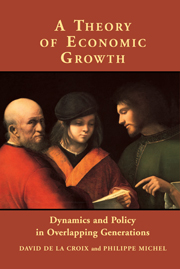1 - Competitive Equilibria
Published online by Cambridge University Press: 29 October 2009
Summary
The basic overlapping generations model with capital accumulation is due to Allais (1947)1 and Diamond (1965).2 Diamond (1965) considers an economy with physical capital and with or without a public sector. It is a framework in which all goods are real, in the sense that they are consumption goods and/or production factors. In this chapter we describe the framework without a public sector, which is the benchmark model to a wide strand of the literature, and we analyze the properties of the competitive equilibrium.
This chapter is organized as follows. Section 1.1 describes the structure of the model, and section 1.2 discusses the main assumptions. The behavior of the agents is analyzed in section 1.3. The notion of temporary equilibrium is introduced and analyzed in section 1.4. Section 1.5 studies the inter-temporal equilibrium with perfect foresight, its existence and uniqueness. Global dynamics are characterized in section 1.6. In section 1.7 we compare the dynamics under perfect foresight with the dynamics resulting from myopic foresight. Finally, some applications and extensions of the model are presented in section 1.8. Examples are provided throughout the chapter.
THE MODEL
Time t is discrete and goes from 0 to ∞. t belongs to the set of integer numbers N, t = 0,1,2,⃜ All decisions are taken at points in time. The current date is called period t, and we study how the economy operates from date t = 0 onwards. At the initial date, t = 0, there will be initial conditions reflecting the history of the economy.
- Type
- Chapter
- Information
- A Theory of Economic GrowthDynamics and Policy in Overlapping Generations, pp. 1 - 71Publisher: Cambridge University PressPrint publication year: 2002



